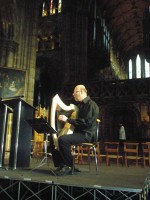St Kentigern’s Medieval Music
February 18, 2009 by localnews
Filed under Churches, Glasgow East, Glasgow North, Glasgow South, Glasgow West, Local News

 Ancient music sings out Glasgow’s story
Ancient music sings out Glasgow’s story
The rare sound of Medieval music in praise of Glasgow’s Patron Saint, St Kentigern, was heard in Glasgow Cathedral in January.
‘It made my hair stand on end just to hear it,’ said Bailie Catherine McMaster, chair of Glasgow City Council’s Local History and archaeology working group who introduced the event. She said: ‘This connects the past with our present and helps us to learn our own story.’
St Kentigern – a sixth century holy man known also as St Mungo – became known as the first bishop of Glasgow and the city’s patron saint. His legendary miracles are remembered in the bird, tree, bell and fish with golden ring, as seen on the city’s coat of arms.
The music was selected from chants of the Office (service) which were composed especially to celebrate his feast day which falls on 13 January. The manuscript which contains this Office is known as the Sprouston Breviary dated around 1300 and is housed in the National Library of Scotland. It is the only known manuscript which contains both the text and the music for his feast.
Known to a limited number of scholars familiar with early editions of the chant texts, it was brought to public attention during the BBC radio series, Scotland’s Music, by John Purser. Following that, Alan and Rebecca Tavener of Cappella Nova commissioned Dr Greta-Mary Hair and Dr Betty Knott-Sharpe to prepare a performing edition of chants from the Kentigern Office for a concert and recording.
The performance in Glasgow Cathedral was given by Canty and Schola Glasguensis – professional Medieval singers and musicians. Canty director, Rebecca Tavener said: ‘Performances of medieval material would not be possible without the tireless expertise and generosity of very special scholars, Dr Greta-Mary Hair who transcribed and edited the music and Dr Betty Knott-Sharpe, editor and translator of the texts.’
Afterwards, Dr Hair told the LOCAL NEWS: ‘It is always gratifying to hear a good, live performance after having worked on the manuscript.’
* The entire Office will be published later this year by Musica Scotica Trust.


